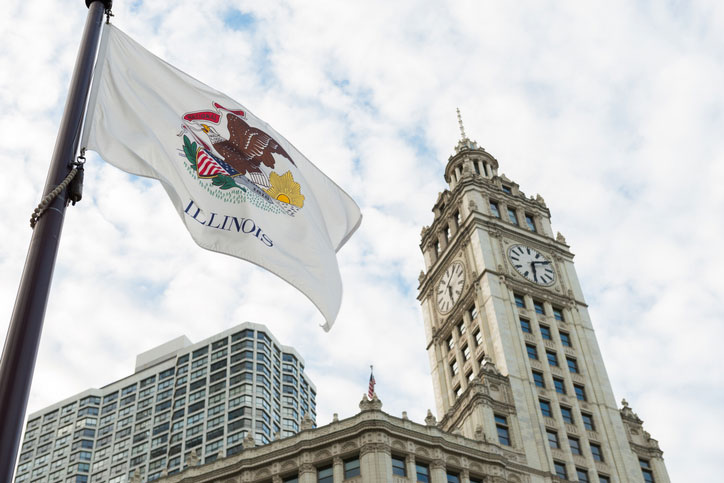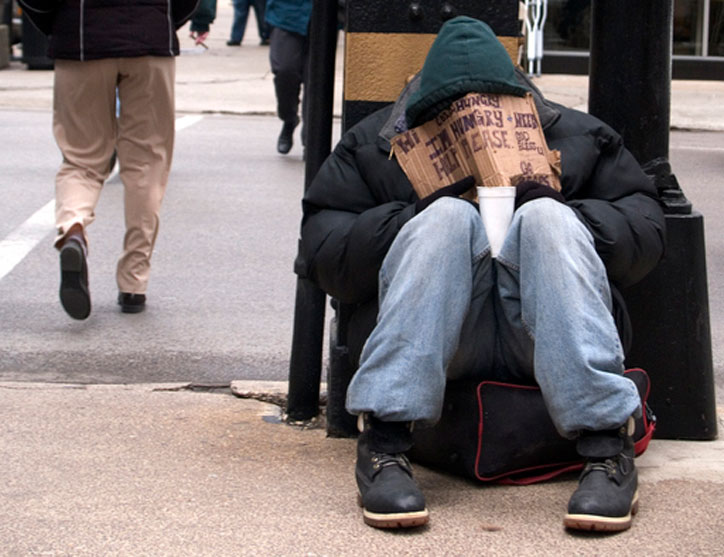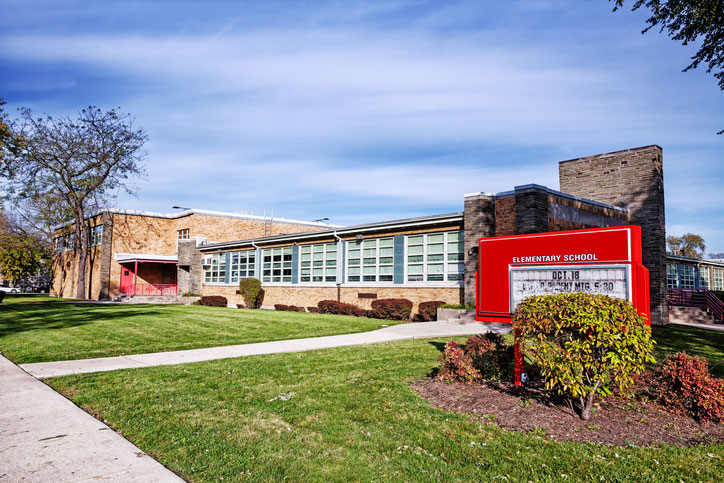Created by Illinois Social work EDU Contributing Writer

With 5,818 human services organizations, Illinois employs 114,109 human service workers in nonprofits, private practice, and government agencies that serve discrete populations and diverse communities across the state.
These include youth and families, seniors, unhoused people, people with disabilities, and individuals and families facing poverty, racial injustice, and violence in their communities.
Social Work Levels: Micro, Macro, and Mezzo
Under the umbrella of social work, three levels differentiate the context and environment of a social worker’s chosen area of focus: macro-level, mezzo-level, and micro-level.
You may specialize in an area within this organizational framework. For example, you may specialize in criminal justice and corrections social work at the macro level or mental health social work at the micro level.


Let’s define these three levels, so we’ll have more context when exploring the specializations.
Micro-level social work
Micro-level social work is probably the type of service that comes to most people’s minds when they think of social work. Professionals at this level work directly with individuals and families to support the safety and well-being of vulnerable populations. Whether they’re advocating for LGBTQ+ rights or helping refugees find housing, micro-level social workers promote human rights and strengthen society.
Macro-level social work
Social workers who provide service on a macro level focus on broad issues of social justice on a systemic level. This may involve research, policy, or state, federal, or international programs. Macro-level social work involves serving individuals indirectly and is every bit as important as working with clients directly.
Mezzo-level social work
Practicing social work at the mezzo level puts the social worker in direct contact with clients in group settings or organizational environments, such as homeless shelters, schools, and drug rehabilitation facilities.
Within each of these three levels, Illinois social workers can engage in generalized practice or specialize in a particular area or with a specific population.
Types of Social Work and Career Opportunities for Social Work Specialists in Illinois
Illinois offers social services and resources for people and communities where advocacy and support are needed. Social workers who specialize in any area will find meaningful job opportunities and rewarding career growth throughout the Prairie State.
Aging & Gerontology
In Illinois, the aging and gerontology specialization addresses the unique needs of the state’s older adults. Social workers in this field work in settings such as nursing homes, long-term care and assisted living facilities, and community centers. They provide counseling, connect seniors with support services, and advocate for policies that enhance the quality of life for the elderly in Illinois.
As the state’s aging population increases, organizations and agencies in Illinois will need more social workers who specialize in aging and gerontology to meet the evolving needs of its senior citizens.
Aging and Gerontology Social Work Organizations
- Council for Jewish Elderly
- AgeOptions
- Northeastern Illinois Area Agency on Aging
Child Welfare
Child welfare social workers in the state focus on the welfare and protection of children, investigating abuse and neglect cases and supporting families throughout Illinois. Through collaboration with families, courts, and community organizations, they ensure the safety and well-being of children.
Illinois DCFS Academic Internship Program
The Illinois Department of Children and Family Services (DCFS) offers the Academic Internship Program for degree-seeking college students who are pursuing a bachelor’s or master’s degree. Offered by universities statewide, the internship program allows students to gain experience in their preferred DCFS office and its specialized area of responsibility.
Illinois DCFS University Partnerships Program
Illinois DCFS also offers experience to social work students enrolled in bachelor’s or master’s degree programs who aspire to work in child welfare after graduation through the University Partnerships Program. The goal of the program is to expose future DCFS child welfare workers to the Placement/Permanency Foundation training curriculum.
Participating universities include:
- Aurora University
- Dominican University
- Governors State University
- Illinois State University
- Lewis University
- Lincoln Christian University
- Loyola University
- Northeastern Illinois University
- Northern Illinois University
- Southern Illinois University at Carbondale
- St. Augustine College
- University of Illinois at Chicago
- University of Illinois at Urbana Champaign
- University of St. Francis
- Western Illinois University
DCFS Shadowing Program
DCFS offices across the state offer shadowing opportunities to students during the fall, spring and summer semesters. You can apply for the program by emailing a cover letter, your reason for requesting a shadowing experience, and two professional letters of recommendation to [email protected].
Child Welfare Social Work Organizations
- The Chicago Area Project (CAP)
- The Chicago Peace Hub
- Thrive Chicago
Criminal Justice & Corrections
Illinois social workers specializing in criminal justice and corrections work at the intersection of social work and the legal system. They may work within correctional facilities, providing support and rehabilitation services to incarcerated individuals. According to the Illinois Department of Corrections, the state has been actively involved in criminal justice reform initiatives, creating opportunities for social workers to contribute to positive changes within the system.
Criminal Justice and Corrections Social Work Organizations
- Restore Justice Illinois
- Chicago Community Bond Fund
Financial Social Work
Financial social work in Illinois addresses the financial challenges faced by individuals and families within the state. Social workers with expertise in this specialized area of the profession provide financial counseling, budgeting assistance, and support in navigating economic hardships.
With a focus on economic justice, Illinois social workers in this field advocate for policies that address systemic barriers contributing to financial inequality in the state.
Financial Social Work Organizations
- People's Resource Center (PRC)
- Help Illinois Families
- Community Action Agencies
Illinois Government Agencies
Social workers employed by government agencies in Illinois have the ability to influence policies and programs that affect communities on a large scale.

According to Illinois.gov, the state government has launched and supported various initiatives related to public health, education, and social services. Government agency social workers contribute to shaping social policies, advocating for equitable resource allocation, and ensuring that vulnerable populations in Illinois receive the support they need.
State Social Services Agencies and Programs
- Illinois Department of Commerce and Economic Opportunity (DCEO)
- Illinois Association of Community Action Agencies (IACAA)
- City of Chicago Department of Family and Support Services (DFSS)
Healthcare and Clinical Social Work
Healthcare social workers collaborate with healthcare professionals to address the psychosocial aspects of illness and promote holistic well-being. They support patients and their families, advocate for patient rights, and connect people with community resources.
In Illinois, licensed clinical social workers (LCSW) are authorized to practice clinical social work independently. According to the National Association of Social Workers, clinical social work includes the assessment, diagnosis, treatment, and prevention of mental illness, emotional, and other behavioral disturbances.
According to state statutes, licensed social workers (LSW) may provide clinical services as long as the services are not delivered in an independent practice.
Healthcare Social Work Organizations
- Purple Binder
- Easter Seals
- Pillars Community Health
- Chicago Family Health Center
Homeless and Housing
Social workers specializing in serving the homeless in Illinois address the complex issues faced by individuals experiencing homelessness. According to the Illinois Department of Human Services, the state government develops programs and services aimed at addressing homelessness.
Homeless and housing social workers work in shelters, outreach programs, and community organizations to provide support and resources to those in need. They also engage in advocacy efforts to address systemic factors contributing to homelessness in Illinois.
Homeless Social Work Organizations in Illinois
- A Safe Haven Foundation
- CEFS Economic Opportunity Corporation,
- Hispanic Housing Development Corporation
- Heartland Human Care Services

Immigration & Refugee Services
Illinois social workers who specialize in immigration and refugee services assist individuals and families navigating the complexities of immigration processes. Social workers provide legal support, connect refugees with essential resources, and advocate for policies that promote inclusivity and protection of immigrant rights in the state.
Immigration and Refugee Social Work Organizations in Illinois
- Heartland Human Care Services
- Illinois Coalition for Immigrant and Refugee Rights
Hospice & Palliative Care
Social workers in hospice and palliative care in Illinois specialize in providing support to individuals facing life-limiting illnesses. They also offer counseling and support to families and caregivers. In addition to interventions aimed at enhancing the quality of life for patients through emotional support, counseling, and coordination of care, hospice and palliative care social workers facilitate conversations about end-of-life decisions and help families navigate the challenges associated with terminal illnesses.
Hospice and Palliative Care Social Work Organizations in Illinois
- Hope Hospice and Community Services
- Illinois Hospice and Palliative Care Organization
Mental Health and Substance Abuse
The mental health and substance abuse specialization within social work in Illinois addresses the intersection of mental health and addiction issues. According to the Illinois Department of Human Services, social workers provide counseling, therapy, and support to individuals facing mental health challenges or struggling with substance abuse. They contribute to destigmatizing mental health problems, advocating for accessible mental health services, and addressing the root causes of substance abuse in the state.
Mental Health and Substance Abuse Social Work Organizations in Illinois
- Trinity Services
- Gateway Foundation
- The Thresholds
- Linden Oaks Behavioral Health
- Bridgeway
Nonprofits
Illinois social workers within nonprofits contribute to a wide range of social causes, addressing issues such as poverty, education, and community development.
Social workers in the nonprofit sector engage in direct service provision, community organizing, and advocacy to create positive social change. Their work is essential in addressing societal gaps, promoting equity, and empowering marginalized communities in the state.
Illinois nonprofit organizations exist at every level and within every specialization of social work. Nonprofits that employ social workers include:
- Children & Youth - Children's Home + Aid
- Aging and Gerontology - Metropolitan Family Services
- Mental Health and Substance Abuse - Above and Beyond Recovery
- Racial and Social Justice - Equality Project
- Immigration - Indo-American Center
- Homeless & Housing - Chicago Coalition for the Homeless
- Financial and Workforce Development – Lifescore Foundation
- Criminal Justice and Corrections – CARPLS
- Civil Rights and Social Justice - Women Employed
These are just a sample of the hundreds of nonprofits in Illinois that cater to a diverse client population. From Chicago to Springfield, regions throughout the state have a demand for skilled social workers with specialized knowledge.
Racial & Social Justice (includes LGBTQ+ Advocacy)
Social workers specializing in racial and social justice, including LGBTQ+ advocacy, focus on dismantling systemic inequalities and promoting inclusivity in Illinois. According to Equality Illinois, social workers in this specialization engage in activism, advocacy, and education to address issues related to race, ethnicity, gender identity, and sexual orientation. They promote diversity, equity, and social justice within Illinois communities.
LGBTQ+ and Social Justice Social Work Organizations
- Illinois Caucus for Adolescent Health
- Queery Chicago
- Center on Halsted
- National Asian Pacific American Women’s Forum
- Equip for Equality (EFE)
- Individual Advocacy Group (IAG)
Schools & Universities
School social workers collaborate with educational institutions to support students’ academic and socio-emotional well-being. According to the Illinois State Board of Education, social workers address issues — such as bullying, mental health, and family dynamics — that may impact students’ educational experiences.
Professional social workers in school settings contribute to the development and implementation of programs that create inclusive and supportive learning environments.
The Illinois Association of School Social Workers (IASSW) notes that school social workers’ “unique graduate-level training in social work enables them to understand and interpret the influences of the school, home, and community on children.”
The IASSW hosts events and conferences that offer CEU credits and insights from social work professionals who have years of experience in the specialized field of school social work.
The association also has a career center where members can post job openings, find qualified candidates, search job listings and subscribe to job post notifications.

Specialized Social Worker Salaries in Illinois
The compensation for social work professionals in various areas of specialization depends upon factors such as experience, education, employer, and location.
Social workers with advanced degrees, such as a Master of Social Work (MSW), often command higher salaries than those with bachelor’s degrees. Experienced social workers earn more and have more opportunities for advancement in their field.
The type of employer and the location also determine social workers’ salaries. The salary structures for social workers employed by government agencies, healthcare facilities, or schools and universities may be different from practitioners who work in nonprofit organizations.
Social workers in metro areas, such as the Chicagoland area, typically earn higher salaries and have more job opportunities than those in nonmetropolitan areas.
According to the United States Bureau of Labor Statistics, as of May 2022, Illinois ranked 5th for the highest employment level of child, family, and school social workers in the country. These social work practitioners earned an average annual salary of $60,740.
Social and community managers in the Chicago metro area earned an annual mean salary of $79,260 and had some of the highest employment levels for these leadership roles in the country.
According to its most recent data (May 2022), employment levels and salaries for the BLS social work occupation categories were:
Social Work Category (BLS) | Employment | Mean Annual Salary |
Child, Family, and School Social Workers | 15,810 | $65,630 |
Healthcare Social Workers | 4470 | $54,870 |
Mental Health and Substance Abuse Social Workers | 1,590 | $54,870 |
Social Workers, All Other | 1,430 | $65,630 |
For social work professionals who want to work in corrections, a degree in social work will also qualify you for a correctional treatment specialist role. According to the BLS, Chicago employs 1,750 probation officers and correctional treatment specialists and pays an annual average salary of $64,990.





